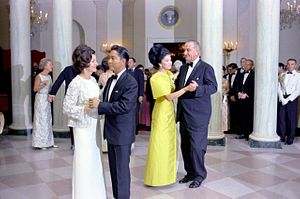Earlier this month, former Philippine first lady Imelda Marcos was found guilty by a local court of committing seven counts of graft and could face a prison sentence of up to 77 years.
News about the verdict, issued on November 9, was welcomed by many activists and human rights groups, which had been demanding accountability for the abuses allegedly committed by the Marcos family during the years of martial law.
Imelda Marcos is the wife of the late strongman Ferdinand Marcos, who ruled the country from 1965 until his ouster from power in 1986. The Marcos family is accused of plundering billions of dollars by creating dummy foundations in several Swiss bank accounts.
But the country’s police chief appeared to be reluctant in ordering an arrest, citing her advanced age and failing health: Imelda Marcos is already 89 years old. Meanwhile, her allies in Congress insisted that there should be no rush in detaining her since her case can still be appealed in the Supreme Court.
Some doubt if her health is really deteriorating, since she is currently a fully-functioning member of Congress and is, in fact, running for governor in her husband’s home province. She was also seen attending the birthday party of her daughter on the same day her verdict was released by the court.
The police have also been accused by some of operating on a double standard, since they have been arresting activists and communist leaders who are already in their senior years.
For most close observers of Philippine politics, there was little surprise when, finally, Imelda Marcos was granted temporary freedom by the court after posting a bail worth $3,000. She convinced the court that her “poor health” prevented her from attending her trial early this month.
What did the conviction of Imelda Marcos, the seeming refusal of the police to arrest her, and the court’s granting of bail mean for Philippine politics?
First, the Philippine justice system grinds too slowly, for the benefit of the rich and powerful. The Imelda Marcos case was filed in 1991 and it took the court 27 years before issuing a guilty verdict.
In addition, the success of Imelda Marcos in evading imprisonment reflects the continuing clout of the Marcos family in the bureaucracy. Despite being forced to flee the country during the “People Power” uprising in 1986, the Marcoses managed to return and they even succeeded in getting elected positions. Indeed, not a single a member of the Marcos family has spent time in jail for the crimes they allegedly committed during the dictatorship.
The indecisiveness of the police to arrest Imelda Marcos reinforces existing perceptions regarding the close links between the Marcos family and President Rodrigo Duterte. As a case in point, it was only after Duterte became president that the remains of the late dictator were finally laid to rest at the Heroes’ Cemetery in Manila. Duterte has made no secret of the his reverence for Marcos: he is consistent in praising Marcos’ leadership and the necessity of imposing martial law to fix the country’s problems.
Thus, it is impossible to imagine a scenario where Duterte has entirely ignored Imelda Marcos’ high-profile case. And from that reality, some have surmised that the unwillingness of the police to execute an arrest order could only mean that the president’s office is not interested in sending the former first lady behind bars.
The debates triggered by the court conviction and the possibility of seeing the other half of the so-called “conjugal dictatorship” inside a prison cell have reawakened bitter memories and old wounds related to the horrors of martial law. The debates are expected to continue next year during the midterm polls and they could be nastier since Imelda Marcos’ daughter is running for senator.
The issue provided a glimpse of the possible impact on the Philippine political landscape if Imelda’s son succeeds in his electoral protest against Vice President Leni Robredo. Robredo won over Ferdinand Marcos Jr. by a slim margin during the 2016 elections. We now know how some politicians from the ruling party will use their influence to defend the Marcoses. But we also saw the enduring anger of anti-Marcos activists and their commitment to testify against the sins of the Marcos family.
Finally, the non-arrest of Imelda Marcos is another issue that anti-Duterte forces can invoke in their campaign against the candidates of the ruling party. They can point to the complicity of Duterte in enabling the return of the Marcos family through his open endorsement of martial law and his refusal to acknowledge that abuses were committed during that period. Duterte’s pro-Marcos stance could inspire some opposition leaders to find a common ground with Leftist groups in forming a broader unity against the return of Marcosian rule in the country.
The consequences of Imelda’s conviction continue to spark the realignment of political forces and it could end up in a duel between a Duterte-backed alliance of pro-Marcos groups against an opposition coalition supported by a battle-tested anti-Marcos movement. That is further testament to a broader trend in Philippine politics, where the past can often shape its future.
































